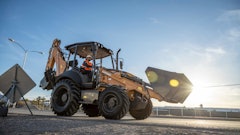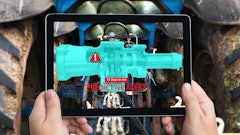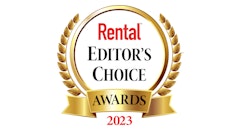
At Rental Magazine, we’ve been reaching out to rental businesses across the country to find out more about how their companies operate and to hear their perspectives on the industry. For this segment, we talked to Jimmy Viestenz from Fairchild Equipment in Green Bay, Wis.
Viestenz started at Fairchild Equipment 21 years ago as a rental technician. He has since held a variety of positions with the company, including shop technician, road service technician, parts expeditor and now rental coordinator. In the Q&A below, he shares how he spends his days in the rental industry, as well as his greatest challenges.
Q: What does a typical workday look like for you? Run us through your day.
Each day is different, working with different customers and helping them through different challenges. That is one of the things I love about my job – there is no “typical;” it’s not the same thing over and over again.
I generally start the day by arranging transportation. This involves setting up the trucking to get rental equipment to customers and I also take care of arranging any other trucking needs for Fairchild’s northern division – getting customer’s equipment transported to and from the shop for repair, demo equipment to customers’ facilities, etc.
Throughout the day, I receive calls and emails from customers/prospective customers looking for rental equipment. First, I work with them to understand their application and the specs they are looking for. Then, I check our rental inventory to find the best unit to meet their needs and share all the information with them. I will also find out if they need training to use the equipment and if they do, I will contact our product support specialist for their area and ask that they reach out to the customer to get them ready to be able to safely operate the equipment.
Between responding to those calls and emails, I follow up with customers who have equipment out on rent to see how it is working out for them. Here at Fairchild Equipment, one of our core values is “Customers for Life,” we strive for excellence in customer service so that customers become partners for life. I want to make sure everything is going well and if for some reason it is not, we can try to get another piece of equipment to them that will work better.
Q: What’s the most important tool, technology, or development that helps you run your business?
Communication is the most important thing that keeps our business running. It’s key to building relationships with customers and making them want to come back to us when they have future needs. A computer is the second most important, to manage inventory and the inventory itself is third.
Q: What do you wish you knew when you first started?
The rental industry is fast-moving so there is not a lot of time to plan. Throughout my years of working in this industry, I’ve learned how important it is to have the forbearance to take a short time to sit and think things through while still keeping up with the needs of customers. There needs to be a balance between planning and speed and that is something that comes with experience.
Q: What aspects of the rental industry do you enjoy most, and why?
I enjoy the people I work with, both internally throughout Fairchild, as well as the customers that I get to meet. I like talking to customers, new and those who we’ve developed relationships with over the years. I enjoy helping them come up with a solution to their problem and strive to take care of them so that they want to return their business. For example, a paper manufacturing company located here in northern Wisconsin had a forklift that needed to be repaired. We sent a road service technician to do the repair and in the meantime, they needed a short-term rental. They knew they needed something that would lift 7,500-pound paper bales, but they weren’t sure exactly what they needed. I was able to recommend a forklift and bale clamp attachment we had available that would work together so they could load and unload paper bales on their semis while their forklift was being worked on.
I also enjoy learning about the new advances in equipment. We offer industrial, construction and agricultural equipment rentals so there are a lot of different types of equipment to learn, from forklifts to floor scrubbers to boom lifts to backhoe loaders to telehandlers, to name a few. Improvements on all of these types of equipment are continually being introduced and it is important for me to stay current on them to be able to provide the best fitting equipment for customers’ needs as well as to be able to answer any questions customers may have.
Q: What has been your biggest challenge as a business owner so far?
The biggest challenge for our rental team has been right sizing our rental fleet so that we can take care of all customers’ needs. Getting to the point where you have learned what types of equipment you truly do need to take care of customers and keeping it that way is really hard.
What we’ve learned is that it is feasible to have a smaller, higher utilized rental fleet, which will take care of everyone, if you know how to organize it (and having a smaller rental fleet, of course, helps keep costs down). While we do have at least one or two units to take care of every type of material handling need, we’ve learned that it is not necessary to have every single category of equipment in our fleet to be able to take care of every need. For example, by getting a little higher capacity forklift, we can then serve multiple customer needs with just one piece of equipment.
Q: What’s the best piece of advice you’ve ever been given?
“Answer the phone. If you don’t, someone else will.” Our owner, Gary Fairchild, gave me this advice and it’s something I’ve stuck by over the years which has served me, and the company, well in growing our customer base.
One piece of advice I was given when I started in my current role was from our vice president of operations, Ken Sharboneau, “Own it. If you don’t own it, you will never go anywhere.”
Here at Fairchild, employees are empowered to make decisions and that is what this advice reminds me.
Q: What three words would you use to describe the current state of the rental industry?
1. Fast-moving: Customers want quick service to fulfill their needs.
2. Strong: The demand for rental equipment has been growing. We have done more business in 2021 so far than we have in previous years.
3. Forward-thinking: Technology is continuing to advance rapidly and newer technologies like telematics and data are helping push the industry forward.
Q: How has the rental industry changed since you started, and where do you see it going?
The equipment has changed a lot; there have been significant improvements in the technology, efficiency and style. Today’s equipment has a lot longer run times than it did when I started in the industry. The introduction of lithium-ion batteries has been a game-changer for the efficiency of electric forklifts. Telemetry systems have also helped improve not only efficiency but also safety.
I see the demand for rentals continuing to climb. More companies are choosing to rent rather than committing to buying equipment, some out of necessity since new truck lead times are pretty long, plus this way they don’t have to pay the overhead for trucking and maintenance on the equipment. Our rental fleet has all newer units (no more than five years old), which customers like because the equipment looks good and runs well. With many companies choosing to rent heavy equipment instead buying it, that also means more longer-term rentals. We have been seeing, and expect to continue to see, more monthly rentals than daily or weekly rentals.
Outside of work, Viestenz enjoys spending time with his wife, two daughters and son on their farmette. His hobbies include hunting, fishing, snowmobiling and ATVing.




























